According to the Volcano Discovery network, over the last 30 days, Croatia was shaken by at least 500 earthquakes, leaving at least seven people dead, dozens were injured, and thousands had to leave their homes. The strongest one — measuring at a 6.4 magnitude — struck the area around Petrinja, central Croatia, on December 29. It was the strongest earthquake in the region in the last 140 years, and was felt all over the Balkans, Slovenia, Italy and parts of Austria.
In the Petrinja area, according to the initial estimates, over 15,000 houses have been severely damaged, while over 3,000 were completely destroyed.
This area was heavily affected by the war, and rebuilt in the late 90s. However, this earthquake revealed many issues related to the postwar reconstruction, and is uncovering many other issues that people in Croatia are faced with. At the same time, it awakens solidarity among people in this country, and the region.
Emina Bužinkić, scholar and human rights activist, lives in Sisak with her family and her small baby boy. They had to leave their house at the end of December. They were among the lucky ones whose house is still standing and could be repaired. They returned after three weeks.
This is Emina’s diary she wrote on her Facebook over the last three weeks in their life, struggling to find shelter, but also finding signs of solidarity and love in these desperate times.
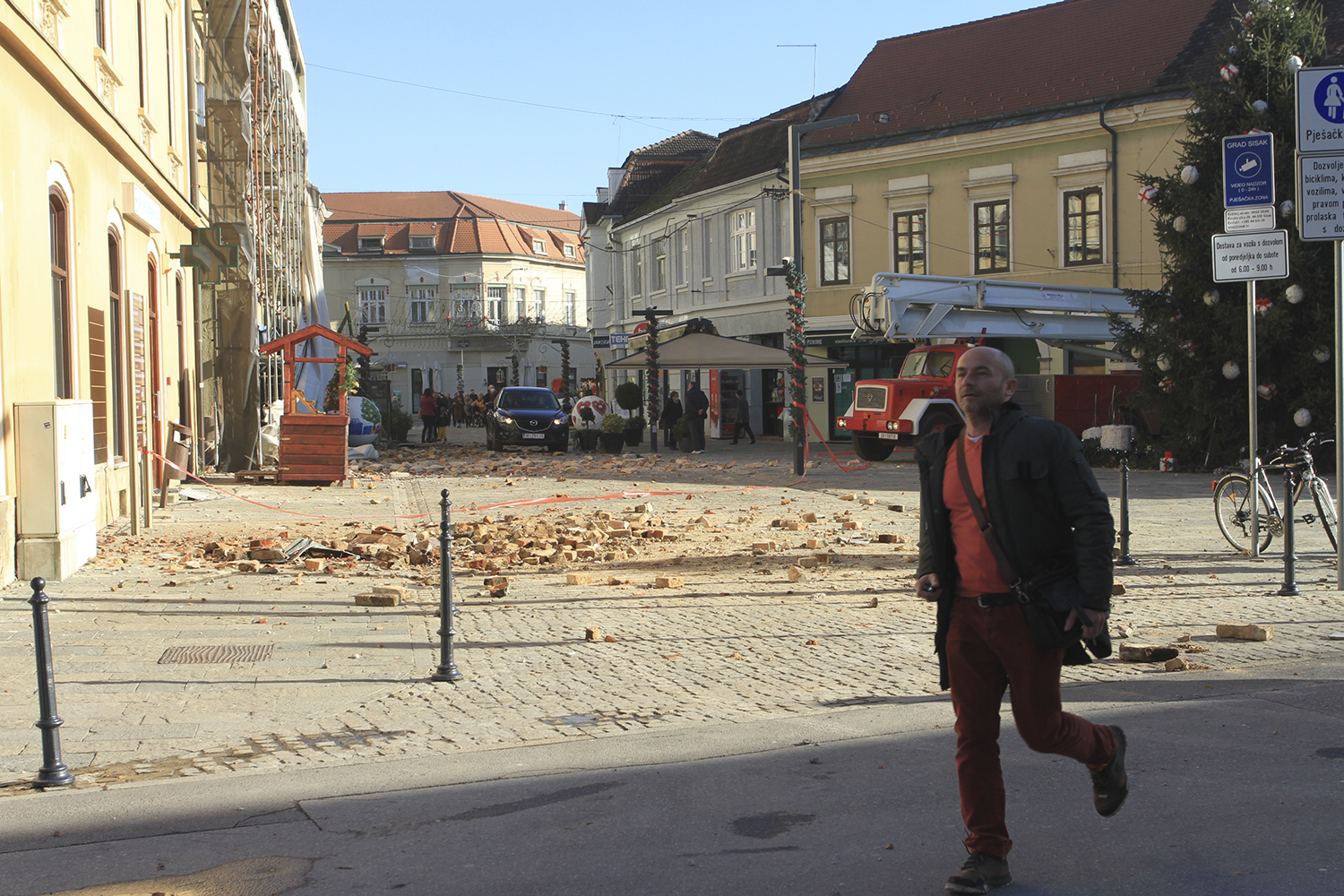
December 28
This morning, at 6:30 a.m., we felt a 5.5 magnitude strong earthquake. Less than nine minutes later, we felt another one. We are good. Thanks to everybody who is asking.
We are standing in the field, in our pajamas. We feel the cold enter inside our bones. We are standing like that for only two or three hours, while I am thinking about all these people on the move who are sleeping like this, outside, for days. This morning we heard the news about one young migrant who died of cold in Bosnia.
A brief update: It’s energizing and humbling to receive your caring wishes. We’re well, as much as one can be. Tremors have been going on throughout the whole day with many of them quieter than the three morning quakes.
Our house is not damaged while many of our family’s and friends’ homes are damaged — from slightly to severe. Much solidarity work in repairing the damage is taking place, among the locals, in defiance and risk of pandemic.
Power to the people, safety to the people!
Dear ones, thanks for checking in from different corners of this magnificent planet. We are safe for now and have been able to have some late morning cups of tea and breakfast. We’re still trembling as all three earthquakes were quite strong while the epicenter was only a few kilometers from our house. Thanks for your healing thoughts and wishes. We’re busy checking in with family and friends right now.
December 29
Your words and acts of care, support and solidarity, friends and comrades, deeply echo and truly nourish.
The past 40 hours were of an extreme emotional (dis) charge and would have been harder had I not felt your prayers, coming from all over the Balkans, Europe, the U.S., Africa, New Zealand … I have not had time to respond to hundreds of messages so I am sharing a few words here.
Many of you asked about the little one. He is well, playful, and carries true light. My parents are alright and the four of us are together.
We have been checking the damage on our house and decided to evacuate tonight to a safer place. The house is not safe and will need to be fixed before we ever live there again. We were so lucky really because many of our friends and neighbors lost their homes.
Surviving earthquakes together feels similar to surviving the war.
The tremors are felt all the time, and only between 12:19 p.m. when the big one hit (6.3) and 4:30 p.m. we had 16 smaller quakes (between 3 and 4.7 magnitude) with aftershocks coming every minute or so. It’s frightening.
I’ve been in Sisak for the past nine months as I wasn’t able to return to the U.S. due to the pandemic. I’ve been saying the word “stuck” a lot. However, I would have not wanted to be anywhere else right now as my gut would be devoured by worry for everyone I know here, especially my family. Surviving earthquakes together feels similar to surviving the war.
Much of what we have been experiencing over the past two days evokes memories of those times when fear and basic survival became the primary identity. Today we sat on the meadow behind my house, while being refugees. Once again. Perpetual refugees. Traumatized and somewhat resilient.
It became so cold today in the late afternoon when the sun set. I was holding my 20- month-old child and couldn’t stop thinking about those mistreated people on the move in Bosnia and elsewhere in the Balkans who have been out there in the woods, streets, jungles with their children — freezing for weeks and years.
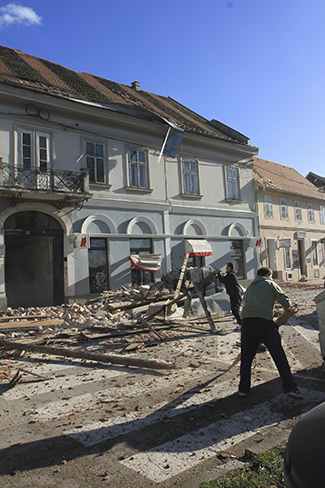
There’s so much to say here about those systems in place that let this politics of death, starvation and illegalization do such harm to thousands of people on the move. And to us as well — not being mobilized enough to push for the political shifts and state of mind.
The very same politics caused the catastrophic consequences of these earthquakes as the parts of Croatia I grew up in have been entirely neglected ever since the war. The beautiful Croatia one meets in the postcards has its stark opposites in the abandoned parts, and people left out to live or die.
Due to the poor construction and never recovered buildings and houses after the bombings and shelling in the early nineties, roofs and walls shattered in pieces, in less than a few seconds during the earthquake. People are still trapped while seven lost their lives. The pandemic of such crude neglect well baked in nationalism and frosted with stingy capitalism is the worst of the pandemics we’ve known here.
Today we entirely forgot about the Covid-19 pandemic. No one wore a mask, and we didn’t keep much distance. We couldn’t stop holding each other.
Update: We keep feeling tremors. Our house is not safe but we have a tent. Many of us are out there in the streets and it’s getting really cold.
Feels like war, somewhat worse actually.
Most of our family and friends lost their homes, they entirely crashed. People still trapped, the first counts of lost lives.
Solidarity is showing everywhere.
This one was the strongest so far, the ground was shaking like never before.
Update: Many homes around us, especially in Petrinja, are entirely damaged. Lots of solidarity work happening: Two friends just jumped on our roof to fix the damage. Also, the army, police, firefighters, medical crews are scattered all around as the quake shook over the long stretch. We’re praying that trapped bodies remain alive.
People are trapped. Firefighters and ambulance vehicles drive in and to all directions.
My immediate family is OK but we’re still checking in with the extended family and friends. This one was the strongest so far, the ground was shaking like never before.
December 31
Gut wrenching days as the survival, death, loss of home and fear repeatedly occupy us. Wars, floods, earthquakes, the Covid pandemic — all the past and current events and memories overwhelmingly conflated.
I keep hearing detonations with the fall of a brick from the roof. Even minor tremors cause anxiety. The sound of an ambulance brings me back to the nineties and those paralyzing moments in which you realize that death progressively multiplies. Layers and layers of trauma peeling like an onion.
“Sačuvali smo žive glave!” (Our lives are saved) We keep repeating that we are alive, and that’s all that matters. That is truly all that matters. It is also deeply unsettling to leave behind your house, the walls built by your ancestors, the transgenerational energies living among the cracked walls, the place where you made your first steps, where your child made his first steps, where you shelter when the world out there hurts you.
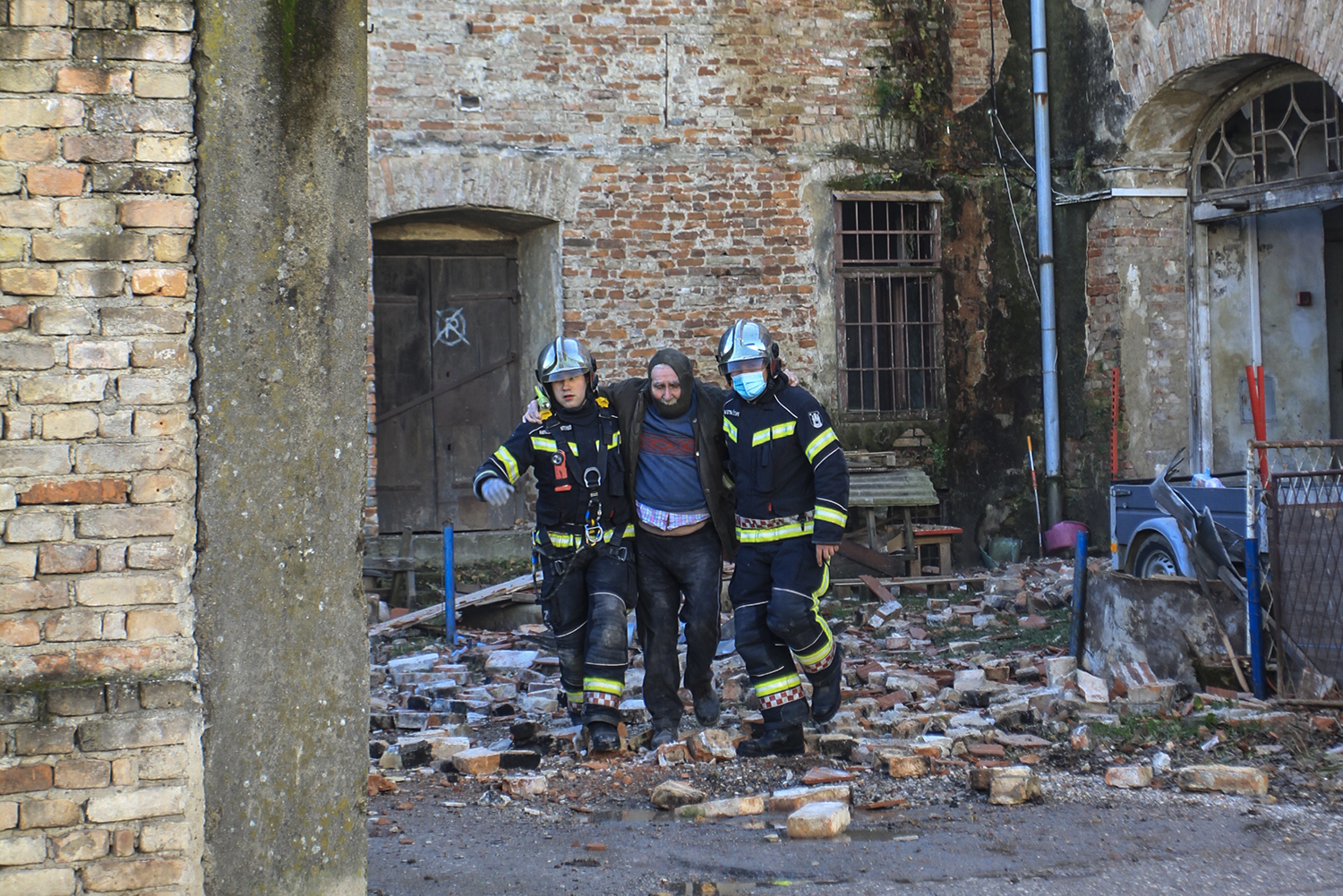
Many of us stood in front of our homes when they shook, broke or collapsed in a blink of an eye. What crashed in our inner worlds then, will need deep and long restoration.
We can’t stop talking about the tremors and destruction and we’re thankful to those who are holding us in this specific moment.
This specific moment mobilizes much of what is known about the crisis, but insufficiently attended to. As you can read from this write-up, the labor of working through the collective trauma immensely matters. What also matters is understanding that much of the destruction that happened is not only the work of nature but also the negligent work of social institutions and ethnonationalistic politics that left the region I come from to a thirty-year-long survival.
Also, the rhetoric deployed by the military, politicians and football fan groups helping the reconstruction — mobilizes the warlike state, making an enemy of the environment that is mistreated by us, and setting the groundwork for a militarized response to the crisis. Not to mention the gendered language that masculinizes and militarizes the labor of reconstruction (defense) while feminizing the vulnerability of the situation.
The language of rescue flourishes in this dichotomy.
It's a new year! May it bring still ground and light!
Being and working on other crises before, what seems to be repetitive is walking the thin line between solidarity and humanitarianism. People truly need help now and the restoration of their dignity too. Help us in building our resilience right now and recognizing our strength. Don’t object to us and subject us to receiving your aid, and then needing to take a picture with you for your Facebook wall.
This might be a different labor we need, a labor of fierce solidarity that rejects populism, publicism, and vanity. This is said in particular in relation to the arrival of foreign donations and international workers that have been reshaping our geographies.
January 1
It’s a new year! May it bring still ground and light!
It felt odd yesterday, to see the fireworks in the sky and hear the loud celebrations only hours after we evacuated from what used to be our house. New earthquakes caused irreparable damage, and probably more yet to come as the ground remains shaking and reminding us of our fragility. It’ll be months before we will be able to return.
Our extended family and friends lost their homes too, however no one was trapped under the piles of heavy bricks. I feel so much gratitude at this moment. For life, for having all of you holding us, for the embraces received these days, for all of you who made us a warm soup and offered a pillow, and for the opening of the new.
What is NEW will keep unfolding and inscribing new meanings as we walk our pathways.
What might it mean to recognize and embrace the new in these very moments when we are facing the destruction and losses? Can we mobilize the inner strength and resilience to see beyond the destruction? Can we just pause for a moment while feeling the vibration under our feet — to become aware of the cry of the Mother Earth?
What might this whole experience mean for us to discard perpetual divides along ethno-national, racial and class divides and bring our journeys closer together? What complexities and ways forward is this current moment revealing for us? All is connected.
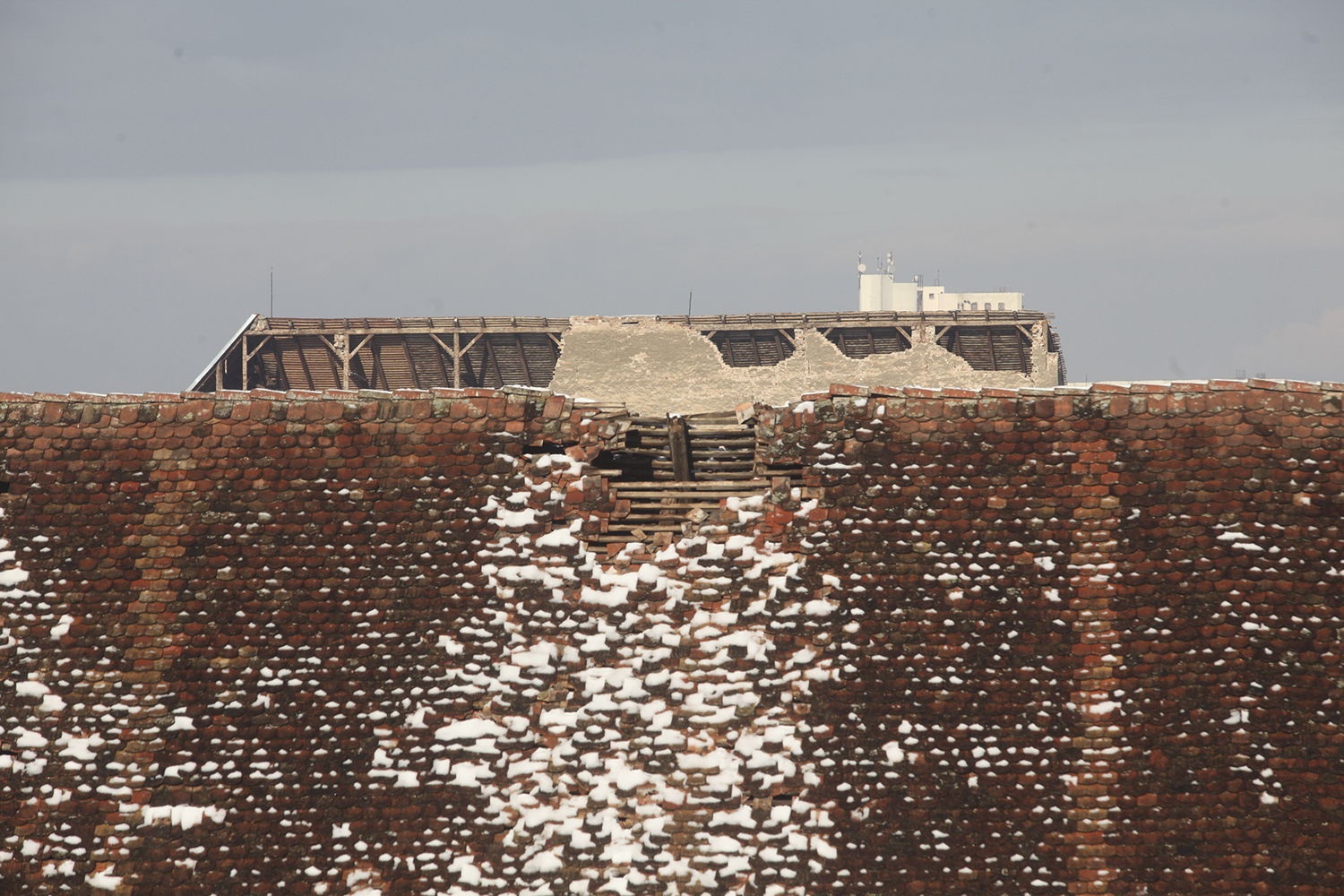
To grasp what lies in the heart of that connection, might be a well needed tremor for us. While I stand on the most unpleasant of the dance floors, I call us to devote our energies to cultivating the resilient vulnerability and nourishing the deep political work of solidarities.
This shall be my epicenter for 2021.
January 2
When everything goes into silence and the sky becomes dark, fear starts pounding heavily. Nights are harder than days as the tremors carry different vibrations and sound. Closing one’s eyes turns into a game of convincing oneself that the ground will be still and silent. The exhaustion prevails and knocks out for a few hours before the first nightmare makes the heart beat faster.
It’s day/night six after the first three quakes, and day five after the big one. The news, the apps, and social media keep reminding us that more than 310 earthquakes occurred over the last five days. Earth’s dithering might last for months. Our fidgeting probably for years if not for a lifetime.
Experiencing trauma feels like a trap — no matter how much you’d like to depart from it, it draws you back. It pulls you in heavily and makes you spin while you see no exit. Just like an earthquake — your legs would like to run but you stay paralyzed as you watch chimneys and roofs falling, as you read terrifying expressions on people’s faces, as you hear loud sounds of destruction.
Life after an earthquake is labor of reconstructing — reconstructing the inner self alongside the physical reconstruction of our homes and public spaces.
Healing trauma, healing collective trauma, should be our priority. Will that happen is highly unlikely. Those invisible fractures remain neglected as “life must go on.” To work on personal healing or a collective one through therapy holds a strong stigma in our society. Thus many shy away from seeking such help.
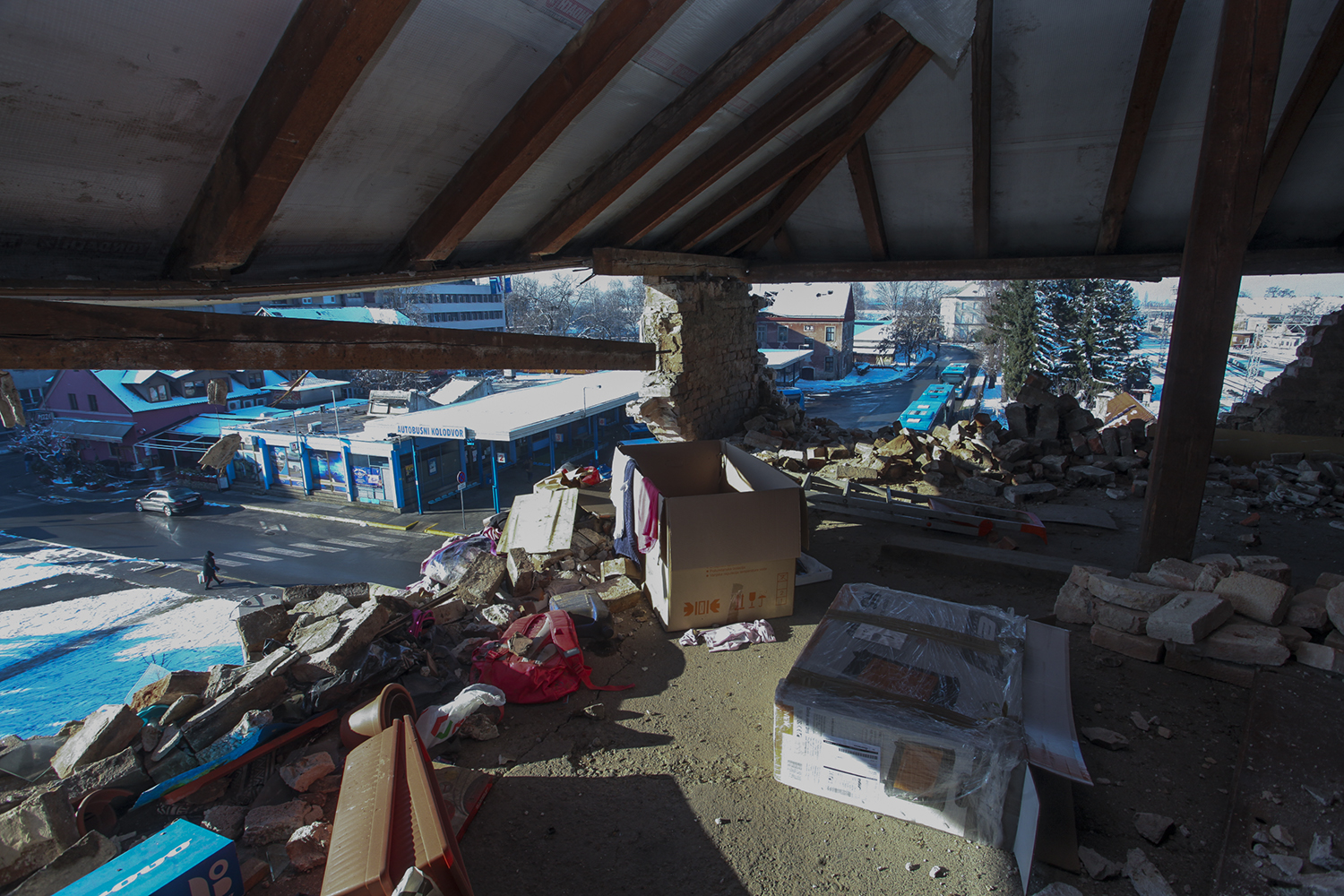
However, can we look into those fractures more closely, with tenderness and empathy, and start weaving in threads of solidarity accounting for our inner selves?
Can we build jointly the politics of radical love and care embracing the self and the collective, while discarding stigma and shame?
Can we turn this moment of destruction into a construction of resilient vulnerabilities and solidarities moving beyond visible?
January 5
Eight days after the first in the series of tremors, the ground does not seem to settle down. The trembling spikes with such agony as its torturous character keeps pushing everyone over the edge.
When I close my eyes, first I see the meadow where I froze while holding my baby last Tuesday when the 6.4 shook off all the joy of life.
When the 4.4 magnitude quake hit this morning, phones started dialing and ringing nervously — another cycle of checking if everyone’s OK. The game goes on with players reaching the point of exhaustion when crumbs of hope and positivity turn into chilling anxiety.
When I close my eyes, first I see the meadow where I froze while holding my baby last Tuesday when the 6.4 shook off all the joy of life. The ground cracks wildly and devours us, pulling us fast and with such force to its deep dark layer where life breathes out.
Then I open my eyes to try to close them again. And when I finally do, I see Milan from Kukuruzari in tears and Ana from Banski Grabovac standing speechless in front of the force that has forever changed their lives. And thousands of those who have been out there in the rain and mud, in this cold weather for six nights.
And then, I open my eyes again only to close them again to feel the pain of all the people on the move in Bosnia and Serbia without shelter, of all the Rohingyas in Bangladesh and elsewhere, of all the Yazidi women who have been subjected to sexual abuse, of all the child soldiers. The heavy burden of this world to feel, it keeps constricting my heart.
At the same time, my heart is getting pumped. For two reasons: The labor of gratitude, and labor of solidarity. His little warm body curled up against my arm, his smell, the tenderness of his feet touching my hand — lays such beautiful and peaceful grounding.
My parents are strong, resilient and calm amid all the uncertainty. My extended family is safe and supported. Friends and colleagues keep checking in, making warm soups, offering material support, hugs and conversations defying time zones, mobility restrictions, and complex life situations.
These days I find new responses to the question of how solidarity looks. Being in multiple crises during my not-so-long life, I’ve witnessed how the work of solidarity becomes political, radicalized and transformative. I’ve seen the flip side too, when solidarity becomes appropriated and dulls the blade of the critical work.
January 5
What does it mean to live in solidarities in the middle of the epicenter?
How can the labor of solidarity become our epicenter in the current moment while linking our futures and pasts?
How do we connect struggles yielding longevity and resilience of such political commitment?
Conversations have been sustaining us these days, those exchanges that occur only in crises as our regular lives are bound to capitalism and patriarchy and don’t allow the time to reflect and digest.
It reminds me of those tough winters when snow covers the streets and paces our productivity and hurry. Now we wait, we wait for our homes to be rebuilt, for our families to reunite, for our lives to sew stitches. We are asked for enormous patience while cold and damp weather chills our bones. We are asked for patience while this might be the second or the third time we lost our homes to natural catastrophes or human violence.
We are asked for patience while living with the greatest uncertainties of all.
Who are “we,” who is “us?”
We are those who won’t be spoken about in a couple of weeks. We are being them whom we speak little of. Frankly, whom we don’t even think of as the politics of distance, segregation and exclusion sets hierarchies of worth.
Only a couple of hours away, just across the border, from where Bosnian migrant workers came to build the Yugoslav metal industry — people on the move have been confined and sentenced to survival, uncertainty and the constant tremors of the European migration regime.
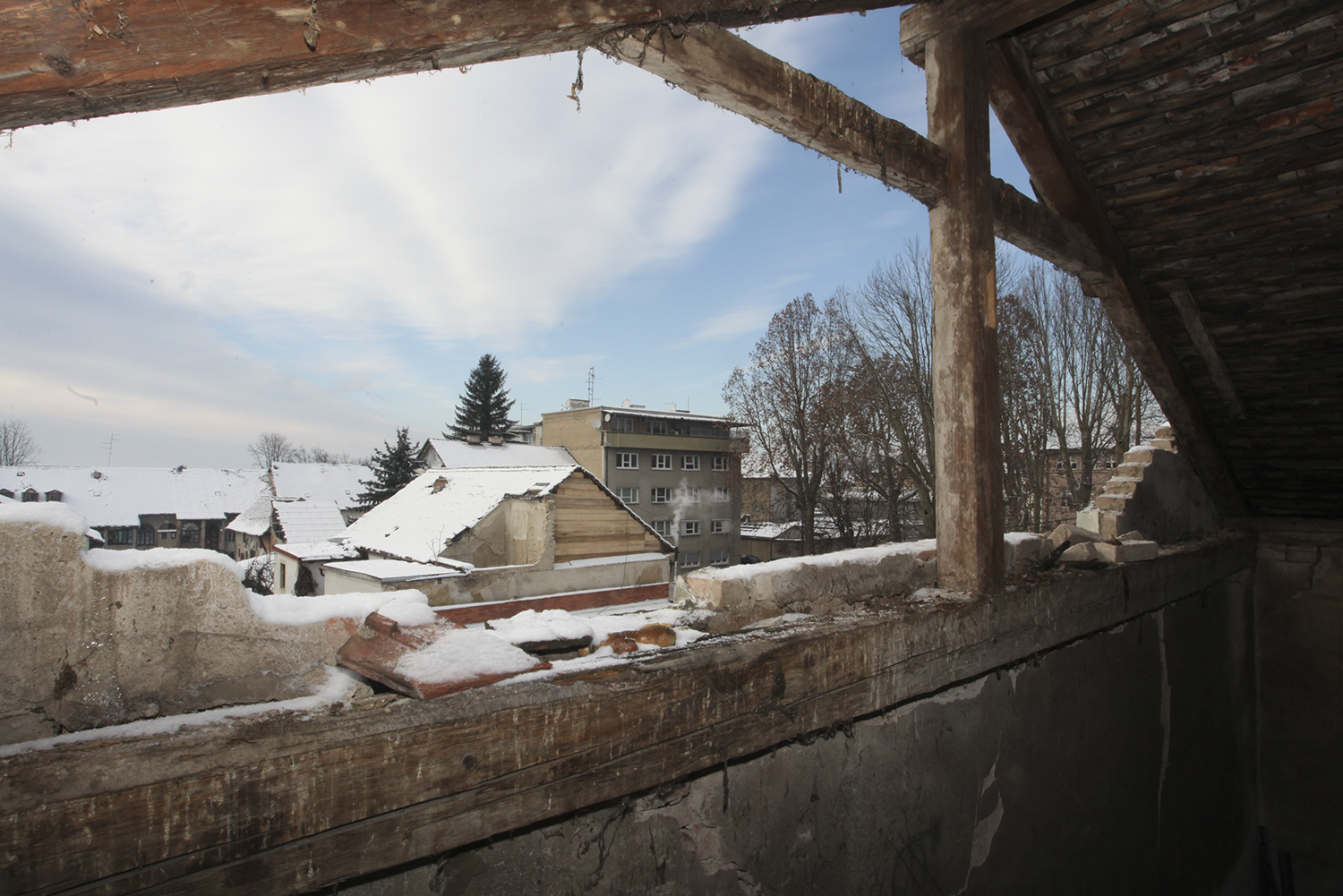
They have been sleeping in the mud for years, their lives have met no stability as the uncertainties are incorporated in every single cell. European countries donate money for tents and camps are run in awful conditions just to keep people away from the borders and terrains of the privileged nation states.
Forgotten, just like people in Banija who have been cast out of society living with no running water and electricity for 30 years. Just like Roma living in settlements, raising their kids in a world that hated them even before they were born. Drawing connections between these “destinies” makes me think of those life stories and experiences and the ways they inform and cultivate our joint political struggles.
In one of those buildings in Željezara, marked yesterday with a red tape, lived a woman in a wheelchair. Two men took her out only after the third earthquake, afterward she sat pale and speechless while the walls were cracking.
My cousin ran downstairs from the third floor of her apartment building with an artificial hip. A friend who cannot see felt the destructive force under her feet and heard the terrifying sound of the trembling ground while losing her orientation. A mother of a child with cerebral paralysis on a respirator covered her son with her body since they could not run.
What does it mean to live in solidarities with people with disabilities in these moments after the quakes so they feel supported and not left behind? I wish us to think of solidarity work as work that calls for intuitive and energetic, yet thoughtful and attentive, needs-based deep work of connection, and by imagination-led labor. In this very moment, and beyond.
January 7
Another 5.5 hit a few hours ago, reminding us of our fragility and the uncertainty we have been muddling through. Triggering as it is, each earthquake pushes us over the edge and “trains our nerves.” The reconstruction needs to pause again as the new demolishing occurs.
But only seconds after the earthquake, I received a message from my postman. He wrote, “Hey Emina, how are you, did you feel the tremors?” I surely did, I let him know, with a side comment, “I felt paralyzed for a moment.” He answered, “Don’t be afraid, all this will come to an end!”
Do you also have a postman who texts you to check in, who comes to your house after his working hours to bring you a package, who even announces whether he’s bringing the shoes or the books!?!
These days the community is stronger than ever. There is so much joy these days, such profound heart opening.
Let’s nourish the beauty and power of connection in sharpening our senses to radical possibilities of love and care.
January 8
Earthquake consequence #1: You feel tremors all the time, even when the ground breathes peacefully.
Earthquake consequence #2: The world is spinning around as the part of your brain for balance is dislodged.
Earthquake consequence #3: Laughing as an internal defense mechanism activates to its full potential.
January 10
When I look back, all of my life has been full of transitions. My child’s life has been an ongoing transition as well. Many of those happened as a result of external forces, only a few really happened with intent.
The unwantedness of change along with the uncertainty of the length of the transition, makes the post-earthquake life so complex. Loaded with all sorts of logistics and emotional labor, we struggle to find focus, make decisions, choose the right way. Shall we return to our house? What if another big one hits? Shall we find a place to sleep in another town? What if it hits there? Shall we send our kids to schools and kindergartens? What if it hits while we are separated? Shall we? What if? Shall we? What if!?
Circling in the mud, going back and forth, the dynamics of being lost prevails.
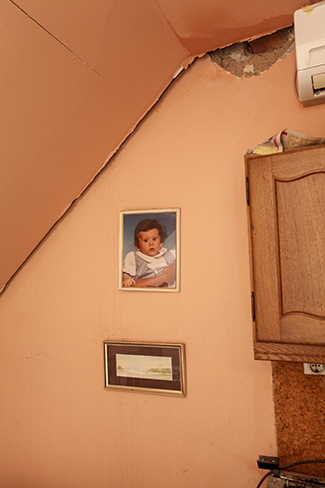
January 16
Another tremor felt a few moments ago brought an image of a family of four (young parents with a baby and a three-year-old). It’s been over two weeks that they’ve been sleeping between collapsed walls so they don’t freeze out in the subzero weather. In the meanwhile, the state promises containers and mobile houses for everyone to be delivered at high speed — 20 to 30 days, they say.
Fortunately or not, Banija has an experience of complete betrayal and false hopes when it comes to state promises. While the state actors debate in their offices how and when they will respond to the crises, thousands of citizen volunteers have been saving the lives and hopes of many. And while the nationalist and fascist state keeps removing civic action and shrinking spaces for solidarity, responses are still vivid and active. These are the threads of an embroidery called solidarity that grows in impossible conditions and gets nourished with and within possibilities being created in the moment.
Numerous conversations these days and the vibe felt among activists resembles action in recent crises; namely the devastation caused by the floods in 2014, and the long summer of migration (Kasparek & Speer, 2015), popularly known as “the refugee crisis.”
Quick self-organizing, participatory mobilization, heartfelt urge to support with the groundwork, coordination among various groups, political advocacy for systemic solutions — have all been in place. Also, the lack of all of those aspects too.
However, what holds repetitive relevance is that the civic action, mobilization and coordination was a stark contrast to what the state did (not do). To many activists in the field, including myself, the late and utterly inadequate state response is not only expected but it sets a firm calling for the continuation of the dismantling of the ”hadeze’s” (HDZ political party) corrupt, incompetent and hazardous rule.
Only moments after I sat my head on a pillow and closed my eyes, as I was going to contemplate returning home after 20 days of displacement, the house moved.
So, the question that opens up before us confronts us with our political inertia and lack of trust in the possibility of ending the parody we have been complicit with. In what particular ways are we going to walk out from the latest of our crises being firmly grounded in the epicenter of solidarity while causing ongoing tremors for the political establishment that has been digging this hole we are falling into, for and with us?
January 17
Only moments after I lay my head on a pillow and closed my eyes, as I was going to contemplate returning home after 20 days of displacement, the house moved. The tremble was short and strong. In the blink of an eye, fear invaded my internal organs and heart went on racing. Breathing became shallow as I protectively covered my little bundle of light.
While we drove on the highway passing by the fields covered in snow, my dad shared the words of a psychologist who advised the nation to delete the app that buzzes every single time when tremors are felt. According to her, we should move on with our lives and do our best to step out of our trauma. I deleted the app in agreement with such a wise thought. I also reinstalled the app an hour ago — when my contemplation was interrupted, and read that over 500 trembles were felt over the past two and a half weeks. Also, earthquakes are currently hitting hard in Turkey, Greece, Russia, Moldova, Chile, California and elsewhere.
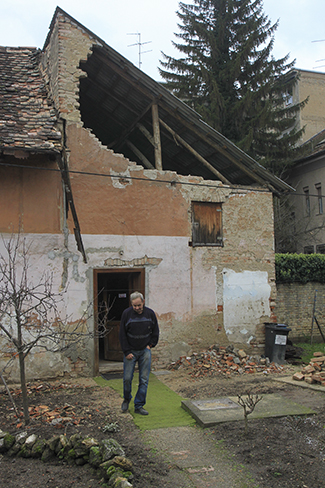
Over the past three weeks I slept in a comfortable bed, spent days in a heated space, ate fresh food made with love, met friends and comrades with whom I enjoyed nourishing conversations, jumped in puddles, and even watched TV (have no idea when that last happened). Merciful, opening, and energizing. However, I carried the sneaky feeling of being where I didn’t want to be. The transition was uninvited, abrupt and merciless.
Hours of cleaning the mess reminded me how much I love this house, a holder of life memories, subtle ancestral energies, and a sense of belonging. If I belong anywhere, and I don’t belong anywhere almost at all, then it is here where my head is currently resting. Where do other heads rest in these cold days, when the fields are covered in snow while their belongings are ripped off? What kind of mess will we all need to be cleaning in days to come?
As I unpacked a bag, again I paused to see what I grabbed when I ran into the house before leaving it. Here’s my list:
— passports (taking the advantage of the privilege amid the ruthless global migration and border regimes),
— tweezers (blame it on patriarchy and imposed beauty standards),
— a pen and a notebook (scribbling and jotting down thoughts, ideas, plans — it is a human right),
— pink quartz (for moments of silence devoted to healing and spiritual self),
— wool socks (freezing feet are a huge discomfort),
— a broken phone (damaged during the earthquake and now resembles the spiderweb cracks on the walls), and
— dandelion tea (morning rituals are on a mission of grounding us).
As we were packing in a rush, hurried by the sound of cracking concrete and squeaky wood, we ended up taking a bunch of stuff we haven’t even looked at while we were away. We also didn’t miss any single material thing from our house but rather a place, and us feeling safe in our place. Our homes give us a sense of safety. At least they used to before the tremors echoed our fragility and exposed our vulnerable selves to the shaking ground.
Feature image: Miroslav Arbutina Arbe.










Predobro opisano, ostala mi teška trauma jer sam u vrijeme najjačeg potresa bila na brdu u šumi i vidjela snagu prirode.